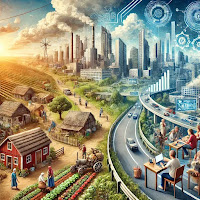Relationship between Social Change and Sustainable Development
The social Change and Development major focuses on social processes and problems. It addresses the problem of why and how societies and cultures around the world change. It stresses historical, comparative, and critical perspectives because understanding the present requires understanding the past, and understanding our own lives and society requires understanding the world.
Sustainable development
Sustainable development is the process which effectively balances the needs of development with concerns for the health of the environment. It is characterized by economic and social growth that does not exhaust the resources of a host country; that respects and safeguards the economic, cultural, and natural environment; that involves grassroots participation and builds indigenous institutions; and that is nurtured by eco-friendly policies and programmes.
The United Nations sponsored two worldwide summits – the Rio Conference on Environment and Development in 1992 and the Johannesburg World Summit on Sustainable Development in 2002 – which encouraged governments to partner with NGOs and private industries to make a bold commitment to supply sustainable development principles in every area where humans impact on the environment.
Thus, the concept of sustainable development provides a framework for integrating environmental policies and development strategies with implications at international, national, regional and local levels. Development should not endanger the natural systems that support life on earth.
Ecological and environmental issues
The interaction between the environment and society is an area of major concern to modern sociology. The quality of our social life depends on the quality of the natural environment, and human actions directly impact the ecosystem. The global ecological crisis is leading scientists to a new understanding of man’s relationship with nature and the need to take a holistic approach to problems.
Some of the major environmental issues are –
1. Global warming:
Greenhouse gas emissions have been the primary contributors to global warming. The gas is released from burning fossil fuels and other unsustainable forms of energy. The effects of carbon emission are not only limited to the atmosphere but also contribute to other health hazards. Public awareness and participation against carbon emissions are essential to pressuring policymakers for prompt actions.
2. Air, water and soil pollution:
Carbon emission creates smoggy conditions in major cities and towns. Air pollution in the city is associated with various public health concerns. Chinese cities like Beijing and Shanghai lead to air pollution from industries and plants. Despite the public underestimation of water and soil contamination, they are also significant public health concerns. The health effects of consuming dirty water are severe, according to Clean Water Act. Finally, soil pollution is a great concern to food security. The use of farm inputs like pesticides and fertilizers is the major factor in soil contamination in the modern world.
3. Deforestation:
Forests are essential natural resources in mitigating adverse climate change. According to scientists, forests are carbon sinks which enhance the absorption of emitted carbon gases from factories. Clearing trees for settlement purposes or otherwise allow greenhouse gases to escape into the environment, thus causing environmental problems.
Today there is a general consensus that the world cannot be at peace unless all living things truly experience the ecosystem in equilibrium. We must engage ourselves with complex management and policy issues to enhance social change and development. Only then can we preserve, sustain and protect all living things and ourselves from polluting our environment.
Or
Relationship between Social Change and Sustainable Development:
1. Sustainable development can be described as the progress that aims to achieve a balance between biophysical, technological and cultural aspects of social change.
2. The introduction of innovations without any regard for the traditional knowledge of recipient cultures can be detrimental to the native biodiversity. Ignoring traditional ecological knowledge cannot be sustainable.
3. The cultural aspect of social change is often the slowest to change. Technological innovations often leave behind cultural lag and several associated social problems when unaccompanied by changes in attitudes and values. For example, there are more cell phones than toilets in India.
4. The race to create and adopt technological innovations has had a ripple effect visible through rising consumerism. This ultimately affects the climate and the effects can be felt through Global Warming and Climate Change. These are no longer theoretical concepts but real and visible challenges. For example, extremes of temperatures, sudden heavy rainfall causing floods and rising sea levels are only an effect of human activity.
5. Such damaging effects in the name of development cannot be described as sustainable. Sustainable development goals need to focus on poverty eradication and climate equality. Rich nations need to change and adopt low-cost energy systems. Reduction of greenhouse gases is a must.
Today, there is a general consensus that the world cannot be at peace unless all nations unite for peace and prosperity for the people and the planet, now and into the future. We must engage with complex management and policy issues to enhance social change and sustainable development. Only then can we go hand-in-hand with strategies to preserve, end poverty, sustain and protect, improve health and education, reduce inequality, and spur economic growth – tackling climate change and working to preserve our oceans and forests.





0 Comments